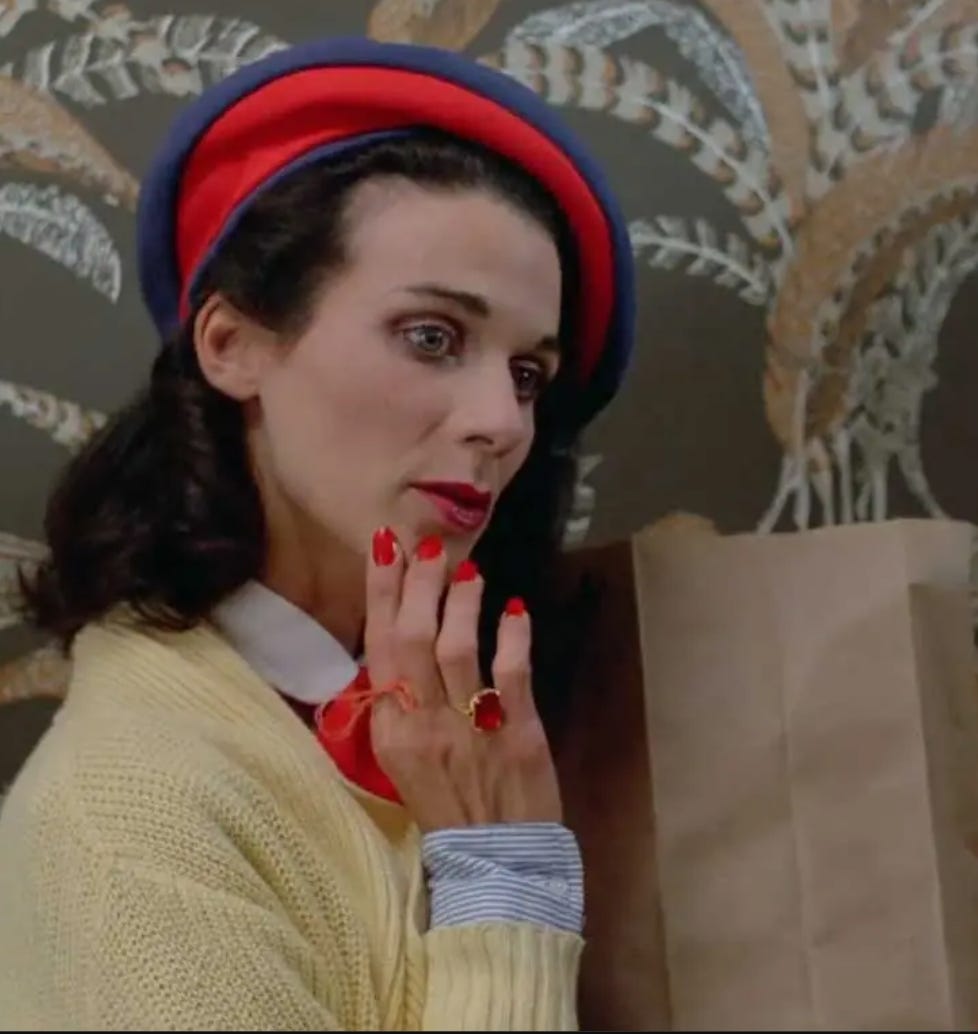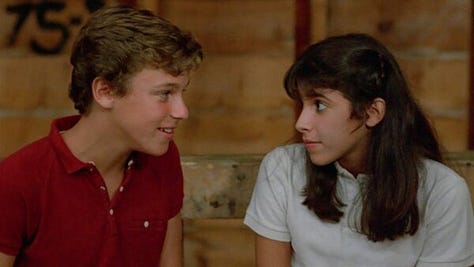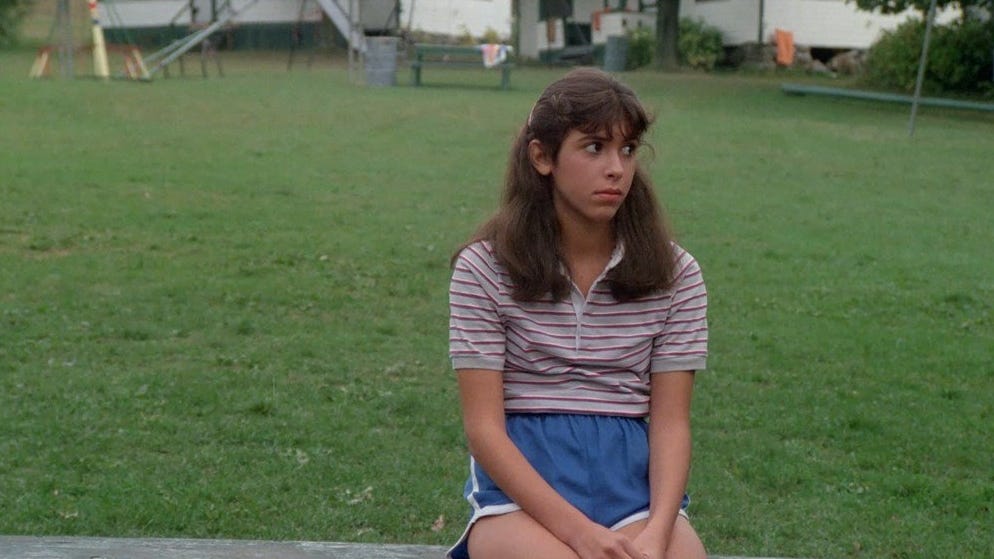Contains spoilers for Sleepaway Camp (1983)
CW: Discussion of transphobic and homophobic themes and representation in film.
This essay is a year late.
I had planned to write about SleepawayCamp (1983) last June. I had a good portion of this drafted up in notes, but June 30th rolled around and I still had cold feet. It’s a film sticky in decades of discourse, and from its synopsis, it might seem like something to steer far away from watching, nevertheless including in a pride month write up. But the stickiness of the matter was exactly the thing that had driven me to watch it in the first place, and what keeps it fresh in my mind as I discuss the persistent queerness of the horror genre — Sleepaway Camp was pitched to me as a deeply homophobic, deeply transphobic film that queer people overwhelmingly adore.
So to start, well, a lot of context. A solid disclaimer at the very least, as it’s something I would never dare screen this film without. What follows are three suggested rule changes to the canon — my own recipe for viewing this film through a lens of reclamation. Serve with heavy content warnings a hefty scoop of salt (as I’m not a transwoman myself, and transwomen are the primary target for the bigotry in this film.)
Angela is trans. I’ll use she/her pronouns for the duration of this piece. Although the canon-accuracy of this is extremely complicated if you add in the sequels, and is outright incorrect going by the first film alone, viewing with this framing in mind was the key to me understanding Sleepaway Camp’s cult classic status.
Aunt Martha? What Aunt Martha? Her plotline is the driving force behind the most disturbing transphobic elements throughout the entire film. And I KNOW. I know. Desiree Gould is giving us everything, and her performance is pure camp in itself, but for our purposes, we have to write her character out of this viewing.

Desiree Gould, I have no idea what you were doing making all of these acting choices, but I thank you for it. Angela is the protagonist, and her actions are not entirely forgiven. I often describe this as a potential ‘Good-For-Her’ film, but that doesn’t mean that Angela did no wrong. Nor does any Good-For-Her film for that matter — looking at you, Midsommar. But any idea that she’s a Michael Myers-esque embodiment of evil has to be tossed to the wind.
And I’ll be honest, that’s a big ask. And a convoluted one. And I’d understand any critique of that ask. You can’t ask everyone to do an elaborate series of mental gymnastics to watch a semi-schlocky 80s slasher on a weeknight — and you especially can’t ask that of those who felt a deep, understandable hurt from the vile transphobia that underlines the film. There are plenty of fun horror films you can throw on in the background of a pride party. This, however? Probably isn’t one.
So what the fuck are we doing here?



This didn’t start out as a Sleepaway Camp essay. This started out as a Pride Month Horror Recs essay — final title clearly yet to be determined. But no film on that list sparked a bigger storm of conflicting thoughts for me than Sleepaway Camp, and I couldn’t for the life of me decide if it was appropriate to leave it in or not. I’m always fascinated by media recommendations that are objectively not endorsements, but I worried about the chance that those two concepts would still be conflated. I figured I could just take it out and move on, but without it, that draft never got finished, and the question of Sleepaway Camp all but haunted me for a full year.
Sleepaway Camp is, as advertised, extremely campy. It’s a gory, goofy, mess of a good time and for that alone may have landed itself a spot in the favorite slashers list of many a queer horror fan. But its queer representation — ranging wildly from seemingly accidental to brazenly offensive — still feels far more authentic than any 80s film where someone gets killed by toilet stall beehive (???) probably should.
The infamous twist ending of this film wants me to be afraid of Angela, but time and time again I hurt for Angela. How could I not? Watching her sit off to the side, either unable or interested in navigating the social circles she’s stuck at the periphery of. Mocked for hiding from the boys, until punished for pursuing a relationship with one. Consistently finding herself at the mercy of these hormone-fueled teens who couldn’t possibly understand her — damned if she does, damned if she doesn’t.
Sleepaway Camp has the near-universal relatability of any coming of age film, but it taps deeply into the specific summertime memories of so many queer viewers. Watching Angela be pulled out of her seat, dragged struggling towards the lake, wanting nothing less than to be thrown into the water made my stomach turn. The fear of suddenly being made to change in locker rooms. Public showering. Living in close quarters with people you’re supposed to relate most deeply to, yet feeling utterly out of place. She’s frightened of the people around her, frightened of this relationship that’s slowly developing, frightened of herself. And why wouldn’t she be, when everyone else certainly is?
The rules of the film are simple: those who are mean to Angela die. Those who are complicit live with the consequences. That “Good for her” slasher trope again, right? And I know by those rules, Paul has to die. He kissed Judy after all, and broke Angela’s heart in the process. But the biggest scare in the film is, to me, the biggest heartbreak of it all. Paul’s severed head cradled in her lap. A first love lost. A queer daydream of what could have been. I realized in that moment just how much I wanted Angela to get her happy ending, no matter how much I know this film will not give it to me.
I return again and again to this film not because it’s great representation, and not even because it’s a great slasher, but because it stands out to me as such a perfect example of the inherent complexity of the queer horror community. There’s an episode of Random Number Generator: Horror Podcast No. 9 where their signature dice chose ‘Queer Horror’ to be the style of the week. I sadly don’t recall the episode number, but I do remember cohost Cecil Baldwin immediately raising the question of whether this means ‘actual’ queer horror — queer creative team, actors, themes, etc — or just a film that queer people like. Which is a very valid question, when these things pretty famously tend not to overlap.
Brooklyn Horror Society screened Freddy vs Jason (2003) as a big pride event this year — featuring speed dating to match Freddys with their Jasons. I attended a screening of A Nightmare on Elm Street 2: Freddy’s Revenge (198) last year as a part of Quad Cinema’s pride programming. Scream at MoMA might as well have been a pride event too. The Babadook (2014) was in the Netflix pride category. The Saw leads should have kissed. Chucky said trans rights!
This isn’t a new concept, of course. We’re deeply self-aware of the contradiction, and clearly have a whole lot of fun with it.
A quick plug here for It Came from the Closet: Queer Reflections on Horror, and incredible essay collection which addresses this from cover to cover — and fittingly kicks off with editor Joe Vallese’s introduction to Sleepaway Camp.
Horror puts the spotlight on the strange, the scary, the monstrous, the other — and queer people know all too well what it’s like to live in a world that views you under that same blinding hot spotlight. There’s a real power in grabbing hold of it and twisting it back around. To cheer for the monster (maybe a bit more than we probably should), to empathize with the grotesque (even when the filmmakers seemed to think we shouldn’t), and to see ourselves in the strange onscreen places no one else would think to find a home in (especially when there was nowhere else for us to go).
To me, the status of Sleepaway Camp as a queer cult classic gets to the heart of the discussion. It’s a magnifying glass over the contradictions that you almost have to come to accept to be able to explore the films that have ended up a part of the Queer Canon.
Of course, no group is a monolith, and no one group’s reclamation of a piece of media magically lifts that media up and away from the critiques of any other. There are pieces of media beloved by white, gay, cisgender men that are considered a ‘central’ to gay culture, but that also run rampant with racism, transphobia, antisemitism — just as many queer people do themselves. This community is deeply intersectional, but again, no monolith. Fractured and fluid, the queer community is constantly evolving and changing and (god-willing) growing to be able to find and repair the gaps in our intersectionality. The Twitter infighting is highly memed and often exhausting, yes. But I truly believe that the willingness of so many to take a second look at things, to have tough conversations, find careful compromises, and accept shifting perspectives is a beautiful thing.
Within the horror community, Sleepaway Camp has been a treasure trove of these conversations for decades. And the longer I dwell on it, the more I rewatch it, and the more I read about it, the less I’m sure there’s an easy answer to any of it.
Can Sleepaway Camp be uplifted as a reclaimed piece of gay cinema, while also being critiqued as a proponent of transphobic tropes? Can it be a trans narrative, or even a trans allegory, while in canon, the main character isn’t actually trans? Can we be moved by the representation of a gay romance, when it’s framed as a moment of pure horror? Are we supposed to cheer on Angela? Can we reclaim his story of gender dysphoria if we accept the canon of Peter being forced to live as Angela? Can I recommend this film for a pride month watchlist? Can I recommend this film at all?
I don’t know.
I’d love to see a reboot of Sleepaway Camp where Angela is trans. Where her aunt doesn’t groom her into someone she doesn’t want to be. Where it is a through-and-through Good-for-Her slasher. (Where Judy’s death doesn’t require a whole list of content warnings all on its own — if we’re already in the editing room anyway.) And where the camp of it all isn’t overshadowed by the perpetuation of shameless transphobic tropes that have persisted in society to this day.
But I’m thankful for Sleepaway Camp as it is, if only for the conversation it sparks. For the appreciation it makes me have for the queer following that deeply flawed films of the past have gained, because Hollywood was giving us nothing more to see ourselves reflected in.
And above all, I’m thankful that there are trans filmmakers, trans writers, and trans actors out there today carrying queer representation in horror into the future. A year later than intended, I’m thankful for the films I’m proud to recommend:
Watch T-Blockers (2023).
Watch Hellraiser (2022).
Watch Evil Dead Rise (2023)
Watch I Saw the TV Glow (2024).
And maybe even watch Sleepaway Camp (1983). At best, you get a fun horror film that might stick in your brain like it stuck in mine. At worst, you get a glimpse into just how far we’ve come.






